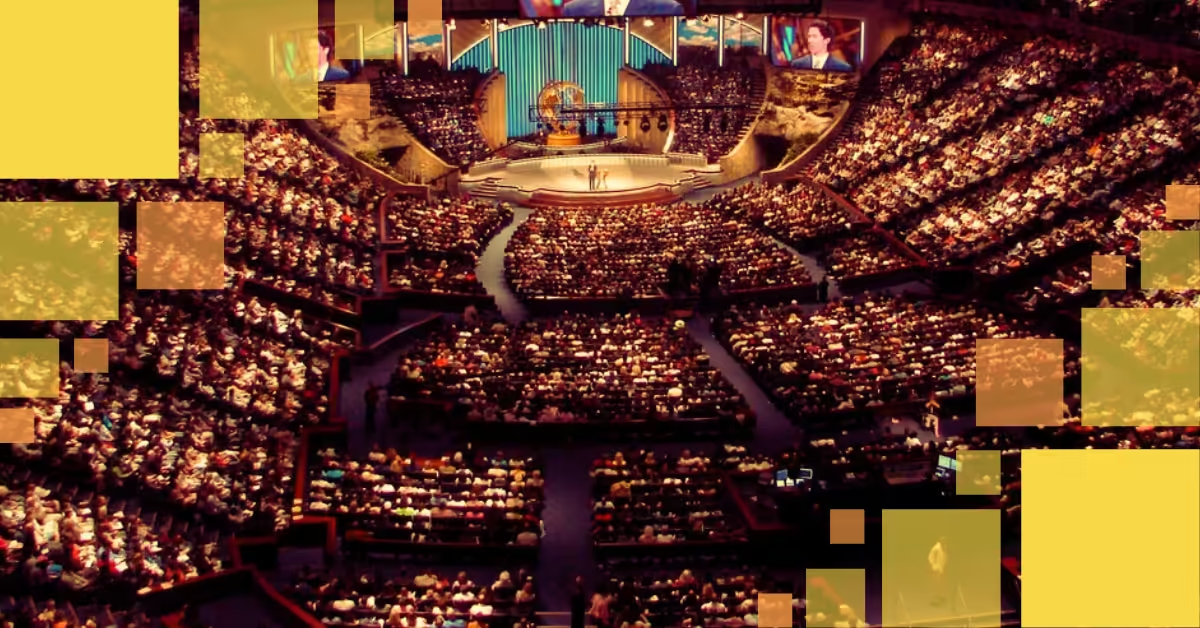In recent years, non denominational Christianity has gained significant attention, with more and more people choosing to practice their faith outside of traditional denominational structures. With a focus on personal faith, Bible-centered teaching, and flexible worship styles, non-denominational churches have become an attractive option for believers who want a fresh approach to Christianity. But what exactly does it mean to be a non-denominational Christian? How does it differ from other Christian traditions?
In this blog, we’ll explore the growing appeal of non-denominational Christianity, including its beliefs, worship style, and the benefits it offers over traditional denominational churches.
What Does Non Denominational Christian Mean?
A non-denominational Christian is a believer who does not align with any specific Christian denomination, such as Baptist, Methodist, Presbyterian, or Catholic. Non-denominational Christians do not follow a set creed or doctrine dictated by a denomination. Instead, they emphasize the authority of the Bible, the teachings of Jesus Christ, and personal faith.
Non-denominational Christians believe that denominational labels can sometimes limit a person’s faith experience, focusing too much on tradition rather than the essence of the Christian message. In a non-denominational setting, there is more freedom for personal interpretation of the Bible, worship practices, and the way the church is organized.
The rise of non-denominational Christianity is often associated with a desire to return to a simpler, more biblically focused faith that prioritizes a direct relationship with God over denominational rules or rituals.
The History and Growth of Non-Denominational Christianity
While Christianity has always been divided into various denominations, the non-denominational movement has grown rapidly in the last few decades. The roots of non-denominational Christianity can be traced back to the 20th century, when many Christians began questioning the need for strict denominational structures and traditions. They felt that these structures often divided believers rather than uniting them in Christ’s teachings.
Non-denominational churches gained momentum in the United States during the 1970s and 1980s, particularly among evangelical communities. The movement’s growth was also fueled by megachurches and media ministries that appealed to a broad audience, regardless of their denominational background.
Today, non-denominational churches can be found across the globe, and their numbers continue to grow. Many believers are attracted to the idea of attending a church that emphasizes a personal relationship with God, free from denominational barriers. This freedom allows for greater diversity in worship styles, interpretations of Scripture, and how each church functions.
Non-Denominational Christian Beliefs: What Do They Follow?
One of the most distinguishing features of non-denominational Christianity is its focus on Bible-based teachings and personal faith. While there is no uniform set of beliefs, most non-denominational churches agree on core Christian doctrines:
- The Authority of the Bible: Non-denominational Christians hold the Bible as the highest authority, viewing it as the inspired Word of God. They believe that the Bible is the ultimate guide for faith and practice, with personal interpretation encouraged.
- Salvation Through Jesus Christ: Like most Christian traditions, non-denominational Christians believe that salvation comes through faith in Jesus Christ. They emphasize a personal relationship with Jesus and the belief in His sacrifice for the forgiveness of sins.
- Personal Faith and Responsibility: Non-denominational Christians place a strong emphasis on personal faith. Instead of relying on denominational traditions or rituals, they focus on individual responsibility in their spiritual growth and relationship with God.
- The Holy Spirit: Non-denominational Christians believe in the active work of the Holy Spirit in the lives of believers. They often emphasize the gifts of the Spirit, such as healing, prophecy, and speaking in tongues.
- Worship Freedom: One of the most appealing aspects of non-denominational Christianity is the freedom in worship. There are fewer restrictions on how services are conducted, allowing churches to adapt their services to fit the needs of their congregation. This can include contemporary worship styles, traditional hymns, or a mix of both.
How Are Non-Denominational Churches Different from Denominational Churches?
While non-denominational churches share some common beliefs with traditional denominational churches, there are several key differences between the two:
1. Lack of Centralized Authority
Denominational churches, such as Catholic, Lutheran, or Baptist, typically have a centralized governing body that oversees their doctrine, leadership, and practices. In contrast, non-denominational churches operate independently. Each church is free to govern itself, choose its leadership, and interpret the Bible as it sees fit.
2. Worship Styles
One of the most significant differences is in worship styles. Non-denominational churches often have more flexible and contemporary worship formats. This can include modern music, less formal services, and an emphasis on community involvement. Denominational churches, on the other hand, may adhere to traditional liturgies, hymns, and rituals passed down through centuries.
3. Emphasis on Personal Faith
While most Christian denominations emphasize personal faith, non-denominational Christians often put greater emphasis on the individual’s personal relationship with God. They encourage believers to read and interpret the Bible for themselves, without relying on formal church traditions or rituals.
4. Leadership Structures
Denominational churches usually follow a hierarchical leadership structure, with pastors, bishops, or priests overseeing multiple congregations. Non-denominational churches tend to have more flat leadership structures, often with a single pastor or a team of pastors responsible for leading the church.
Non-Denominational Church Service: What to Expect?
For those attending a non-denominational church service for the first time, the experience may feel different from a traditional denominational service. Here’s what to expect:
- Informal Atmosphere: Non-denominational churches tend to have a more casual and welcoming atmosphere. Many people dress casually, and the focus is on creating a comfortable environment for worship.
- Contemporary Worship: Worship in non-denominational churches often includes contemporary Christian music played by a live band. While some churches may still sing hymns, most prefer modern worship songs that resonate with younger generations.
- Bible-Centered Teaching: The sermons at non-denominational churches are typically focused on Bible-based teachings. Pastors often encourage congregants to bring their Bibles and engage with the Scriptures during the service.
- Community Focus: Non-denominational churches often emphasize community involvement. Congregants are encouraged to participate in small groups, volunteer efforts, and outreach programs as part of their spiritual growth.
Why More People Are Choosing Non-Denominational Churches
The appeal of non-denominational Christianity has grown significantly over the last few decades. But what is driving this trend? Here are a few key reasons why more people are choosing non-denominational churches:
1. Freedom from Tradition
Many Christians are drawn to non-denominational churches because they feel less restricted by the traditions and doctrines of established denominations. In a non-denominational church, there is often more freedom to explore different worship styles, beliefs, and interpretations of Scripture.
2. Personal Connection with God
Non-denominational churches place a strong emphasis on personal faith and a direct relationship with God. This appeals to individuals who want a more intimate and individualized experience of Christianity, free from the formality and structure of traditional churches.
3. Flexible Worship
The flexibility of worship in non-denominational churches is a major draw, especially for younger generations. With contemporary music, casual dress codes, and engaging services, many feel that non-denominational churches offer a more relatable and modern worship experience.
4. Welcoming Atmosphere
Non-denominational churches are known for their inclusive and welcoming environments. They often make it a priority to ensure that everyone feels accepted, regardless of their background, beliefs, or level of spiritual maturity.
Non-Denominational Christian Worship: A More Flexible Approach
One of the defining features of non-denominational churches is their flexible approach to worship. Unlike traditional denominations, which often follow a prescribed order of service, non-denominational churches are free to design their worship services in a way that suits their community.
This flexibility allows non-denominational churches to:
- Adapt to Modern Culture: By incorporating contemporary worship music, multimedia presentations, and relatable sermons, non-denominational churches can connect with a broader audience, particularly younger people.
- Encourage Participation: Worship in non-denominational churches is often more participatory, with congregants encouraged to raise their hands, sing along, and engage in prayer during the service.
- Personalize Worship: Without rigid liturgical formats, non-denominational churches can tailor their worship services to the preferences and needs of their congregation. This might include offering both traditional and contemporary services or experimenting with new worship practices.
What Are the Benefits of Being a Non-Denominational Christian?
Choosing to be a non-denominational Christian comes with several benefits, particularly for those who are seeking a more personal and flexible faith experience:
1. Freedom in Belief and Worship
Non-denominational Christians have the freedom to interpret the Bible and practice their faith in ways that feel authentic to them. This allows for a more personal connection to faith and worship.
2. Less Focus on Tradition
For some, denominational traditions can feel restrictive or outdated. Non-denominational Christianity focuses less on tradition and more on the core teachings of the Bible, giving believers a more direct and relatable faith experience.
3. Inclusivity
Many non-denominational churches make inclusivity a priority. This means that people from various backgrounds and walks of life can find a welcoming home in a non-denominational church, regardless of their past religious experiences.
4. Flexibility in Doctrine
Without being tied to a set denominational creed, non-denominational Christians have the flexibility to explore different interpretations of the Bible and theological ideas, allowing for spiritual growth and exploration.
Challenges Non-Denominational Christians Face
While there are many benefits to being a non-denominational Christian, there are also some challenges that can arise:
- Lack of Central Authority: Without a governing body, non-denominational churches can sometimes struggle with maintaining consistent doctrine or leadership.
- Lack of Structure: For some, the absence of a formal structure can make it harder to feel connected to a community or to understand the faith more deeply.
- Doctrinal Differences: Non-denominational Christians may find themselves in disagreement over biblical interpretations, as each church can approach teachings differently.
Frequently Asked Questions About Non-Denominational Christianity
- What is a non-denominational Christian?
- A non-denominational Christian is a believer who practices their faith outside of any specific Christian denomination, focusing instead on personal faith and Bible-centered teachings.
- What do non-denominational Christians believe?
- Non-denominational Christians emphasize personal faith, Bible-based teachings, and a relationship with Jesus Christ, similar to other Christian traditions.
- How do non-denominational churches differ from denominational churches?
- Non-denominational churches operate independently, without the governing bodies or strict traditions seen in denominational churches like Catholicism or Lutheranism.
- Are non-denominational churches evangelical?
- Many non-denominational churches can be classified as evangelical because they focus on spreading the message of Jesus Christ and personal faith.
- What can I expect from a non-denominational church service?
- Expect a casual and welcoming atmosphere, contemporary worship music, Bible-centered sermons, and an emphasis on community involvement.
- Do non-denominational churches follow a specific doctrine?
- While non-denominational churches are Bible-based, they do not adhere to a specific creed or doctrine, allowing for more flexibility in interpretation.
- Why are non-denominational churches growing?
- Non-denominational churches are growing due to their flexible worship styles, emphasis on personal faith, and welcoming environments.
- Is there a central governing body for non-denominational churches?
- No, non-denominational churches are typically independent and operate without a central governing body, which gives each church autonomy.
- Do non-denominational Christians believe in the Holy Spirit?
- Yes, non-denominational Christians believe in the work of the Holy Spirit in the lives of believers, often emphasizing the gifts of the Spirit.
- Can I attend a non-denominational church if I’m from a different denomination?
- Yes, non-denominational churches are typically open to people from all backgrounds, making them an inclusive option for worship.
External Resources:
- Christianity Today: Understanding Non-Denominational Christianity
- Bible Study Tools: Core Christian Beliefs
Conclusion
Non-denominational Christianity has grown significantly in recent years, appealing to individuals seeking a more personal, flexible, and Bible-centered faith experience. With its emphasis on a direct relationship with God, freedom in worship, and inclusivity, non-denominational churches provide an alternative to traditional denominations. These churches often attract believers who are looking for a simpler approach to Christianity, one that focuses less on denominational traditions and more on individual faith and community.
As non-denominational Christianity continues to expand, its core values of Bible authority, personal faith, and community involvement remain at the heart of its growing appeal. Whether you are curious about this movement or considering joining a non-denominational church, the freedom and flexibility it offers make it a unique and welcoming choice for many believers. By stripping away the layers of tradition and focusing on personal spiritual growth, non-denominational Christianity is helping to reshape the landscape of modern Christian worship.

Joseph Bush is a seasoned writer and researcher with over 7 years of experience covering a wide range of general topics, from lifestyle and technology to business and current events. He is dedicated to producing fact-checked, reader-friendly content that informs, engages, and empowers readers.
Throughout his career, Joseph has followed strict editorial guidelines, relied on reputable sources, and ensured every article meets the highest standards of accuracy and clarity. His expertise spans multiple fields, allowing him to explain complex topics in a way that’s easy to understand.
Passionate about continuous learning, Joseph stays updated on industry trends and best practices to deliver trustworthy, well-rounded insights. Readers can rely on his work for its credibility, depth, and real-world relevance.




